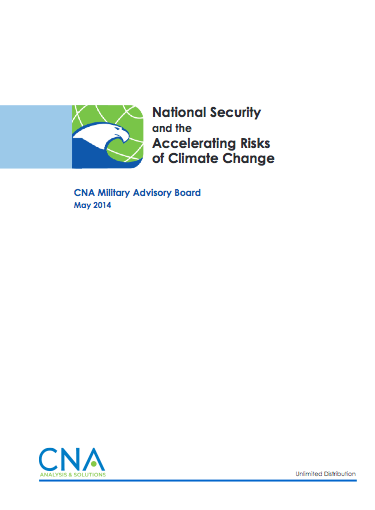 13 May 2014: The CNA Corporation’s Military Advisory Board has published a report, titled ‘National Security and the Accelerating Risks of Climate Change,’ which provides an update to a 2007 CNA report that described climate change as a “threat multiplier.” The 2014 report reexamines climate change impacts on US national security within a more complex and integrated world and, looking at new vulnerabilities and tensions, identifies climate change as a “catalyst for instability and conflict.”
13 May 2014: The CNA Corporation’s Military Advisory Board has published a report, titled ‘National Security and the Accelerating Risks of Climate Change,’ which provides an update to a 2007 CNA report that described climate change as a “threat multiplier.” The 2014 report reexamines climate change impacts on US national security within a more complex and integrated world and, looking at new vulnerabilities and tensions, identifies climate change as a “catalyst for instability and conflict.”
The 2007 report, titled ‘National Security and the Threat of Climate Change,’ brought together 11 retired US Generals and Admirals as CNA’s Military Advisory Board. This Board reassembled for the 2014 report, to re-examine the nexus of projected climate change and national security.
The report asserts that developments in scientific climate projections, observed climate changes, impacts of extreme weather events and changes in the global security environment have accelerated the national security implications of climate change. However, the lack of action by both the US and the international community to tackle climate change remains a pressing concern. The report specifically addresses: possible new threats or opportunities related to projected climate change impacts on the US military; and additional responses the national security community should take to reduce the risks posed to political, military, social, infrastructure and information systems.
The report concludes that, inter alia: only improvements in resilience coupled with actions on stabilizing climate change will reduce long-term risk; potential security consequences of climate change should serve as catalysts for cooperation and change, rather than as catalysts for instability and conflict; rapid population growth, especially in coastal and urban areas, have increased the challenge of understanding the strategic security risks of projected climate change; accelerated melting of “old ice” in the Arctic is making the region more accessible to human activities, including shipping, resource extraction, fisheries and tourism; projected climate change impacts in the US, particularly to military, infrastructure, economic and social support systems, will encumber homeland security; and choices regarding how the finite resources of water, food and energy will be produced, distributed and used will have increasing security implications, given their inextricable links.
The report makes the following recommendations, inter alia: the US should accelerate and consolidate efforts to prepare for increased access and military operations in the Arctic; climate adaptation planning should consider the water-food-energy nexus to ensure comprehensive decision making; projected climate change impacts should be fully integrated into the National Infrastructure Protection Plan and the Strategic National Risk Assessment; and the US Department of Defense should develop, fund and implement adaptation plans, including metrics for measuring climate impacts and resilience.
CNA Corporation, a non-profit research and analysis organization, was created 70 years ago and currently focuses on a range of national security, defense and public interest issues, including education, homeland security and air traffic management. [CNA Introduction to Report] [Publication: National Security and the Accelerating Risks of Climate Change]